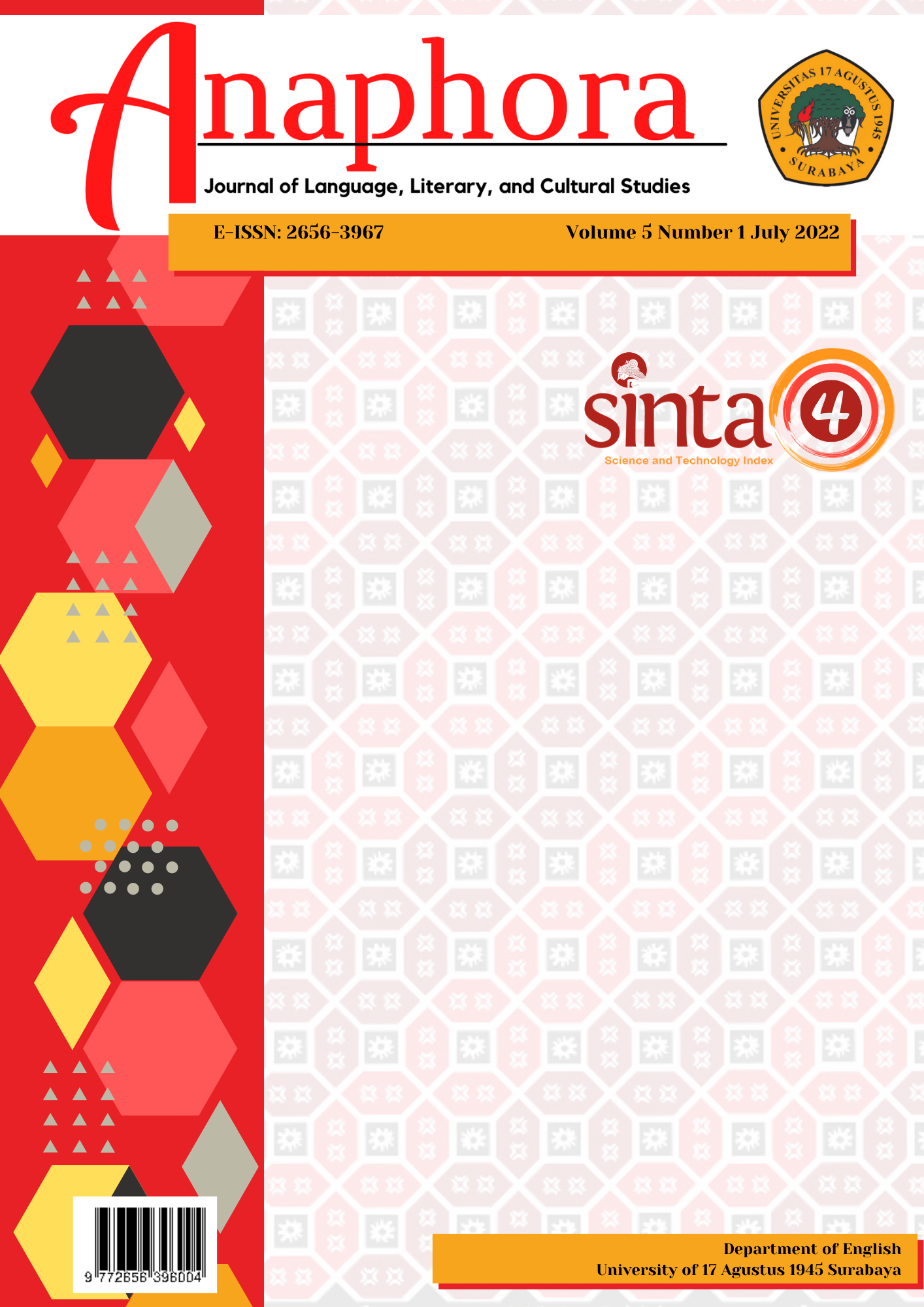Grammatical Errors in Using Tenses Made by ESP Students
DOI:
https://doi.org/10.30996/anaphora.v5i1.6262Keywords:
Error, tenses, Interlanguage, ESP studentsAbstract
Sometimes the students of ESP or Non-English majoring error in using tenses. The low level of students' understanding of tense is one of the factors that greatly influences errors in making sentences. The objective of this research was to describe the students’ errors and its causes in using tenses. In this research, the writers used a qualitative method in a form of descriptive analysis (percentage) that included observation, collecting the students’ test, analyzing, and interpreting the data. For collecting the data, the researcher used test as the instrument. This research was conducted to 35 ESP students of Pharmaceutical Study Program of Institute of Health Science of Siti Khadijah Palembang. The result of the research showed that the percentage of the error made by 35 students as the samples in using tenses was 75%, consisted of the error of selection was 30%, the error of omission was 24% and error of ordering 21%. It means that the students of Pharmaceutical Study Program of Institute of Health Science of Siti Khadijah Palembang made error in using tense, because more than 70% of the students made error. The probable sources of the students’ error were interlanguage error and context in learning error, where 52% errors were caused by interlanguage.
Downloads
References
Brown, H. D. (1994). Principles of Language Learning and Teaching (3rd ed.).
Corder, S. . (1981). Error Analysis and Interlanguage. Oxford: Oxford University Press.
DeKeyser, R. M. (2005). W. makes learning second‐language grammar difficult? (2005). What makes learning second‐language grammar difficult? A Review of Issues. Language Learning, 55(S1), 1–25.
Dulay, H., Burt, M., K. S. (1982). Language Two. Oxford University, Inc.
Eko Setiawan, M. F. F. A. (2018). ANALYSIS OF THE STUDENTS’ ENGLISH TENSES ERRORS Eko. ELT Lectura, 5, 18–22. https://doi.org/10.20594/religionandsociety.4.Suppl_43
Ekta, B., & Natalia, F. (2020). Grammatical Error Analysis o f Business Students ’ Writing. 3(2), 1–10. https://doi.org/10.36597/jelp.v3i2.5307
Ellis, R. (1994). The study of second language acquisition. Oxford: Oxford University Press.
Frith, M. B. (1978). Interlanguage Theory: Implications for the Classroom. McGill Journal of Education / Revue Des Sciences de l’éducation de McGill, 13(002), 155–165.
Ginting, H. K. B., Rahmawati, & Purwanto, P. (2019). Error analysis on using simple past tense in writing recount text at the eighth grade of SMP Bina Bersaudara 1 Medan. Jurnal Edulingua, 6(1), 13–17.
Masruddin, M. (2019). Omission: Common Simple Present Tense Errors in Students’ Writing of Descriptive Text. Ethical Lingua: Journal of Language Teaching and Literature, 6(1), 30–39. https://doi.org/10.30605/ethicallingua.v6i1.1114
Mencias, Y. L., & De Vera, P. (2018). Error Analysis of Verb Tenses among Japanese ESL Learners. Journal of English as an International Language, 13, 185–202.
Merriam, S. B. (2002). Merriam introduction_to_qualitative_research.pdf. In Qualitative research in practice: examples for discussion and analysis (pp. 3–17).
Mohammed, S., Mohammed, H., & Fahim AbdalHussein. (2015). Grammatical error analysis of Iraqi postgraduate students’ academic writing. International Journal of Education and Research, 3(6), 283–294. www.ijern.com
Nurbianta, N., Rahmat, R., & Shollina, A. (2019). Exploring Grammar through Small Group Interaction Technique on Pre-Intermediate Structure Course. English Language in Focus (ELIF), 1(2), 113. https://doi.org/10.24853/elif.1.2.113-120
Seliger, H. W., & Shohamy, E. (1989). Second language research methods. Oxford University Press.
Subasini, & Kokilavani. (2013). Significance of grammar in technical english. International Journal of English Literature and Culture, 1(3), 56–58. https://doi.org/10.14662/IJELC2013.022
Sukasame, N., Kantho, S., & Narrot, P. (2014). A Study of Errors in Learning English Grammatical Structures on Tenses of MatthayomSuksa 4 Students of the Demonstration School, KhonKaen University. Procedia - Social and Behavioral Sciences, 116(2012), 1934–1939. https://doi.org/10.1016/j.sbspro.2014.01.498
TitleLado, M. J. (2008). Practical Complete English Grammar. Jakarta, Titik Terang.
Wirawan, I. W. A. (2019). Global Conference on Teaching , Assessment , and Learning in Education Volume 4. EFL Proceedings, 4.
Downloads
Published
How to Cite
Issue
Section
License
Authors whose manuscript is published will approve the following provisions:
-
The right to publication of all journal material published on the jurnal anaphora website is held by the editorial board with the author's knowledge (moral rights remain the property of the author).
-
The formal legal provisions for access to digital articles of this electronic journal are subject to the terms of the Creative Commons Attribution-ShareAlike (CC BY-SA) license, which means Jurnal Persona reserves the right to store, modify the format, administer in database, maintain and publish articles without requesting permission from the Author as long as it keeps the Author's name as the owner of Copyright.
-
Printed and electronic published manuscripts are open access for educational, research and library purposes. In addition to these objectives, the editorial board shall not be liable for violations of copyright law.















